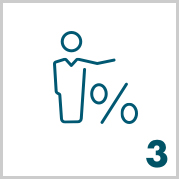Listening to Stakeholders is an important factor in our sustainability strategy and in strengthening our relationship with the Communities we represent.
Infographic transcript
Internal Stakeholders:
- Group people
- Subsidiary Banks
- Subsidiaries
External Stakeholders:
- Customers and Cooperating Members
- Third sector: Bodies and Associations
- Workers' representatives
- Suppliers
What is Double Relevance Analysis
Double Relevance Analysis is a tool that guides Sustainability Reporting according to the European CSRD Directive and the European Sustainability Reporting Standards (ESRS).
It takes into account two dimensions:
Impact materiality: the impact generated by the activity of the Group and its value chain;
Financial materiality: how environmental, social and governance issues affect the Group's performance and positioning.
Our Double Relevance Analysis process, which is updated annually, is structured in the following steps:
Sustainability issues
Infographic transcript
Sustainability issues concern aspects:
- ENVIRONMENTAL
- Climate change
- Pollution
- Water and marine resources
- Biodiversity and ecosystems
- Resource use and circular economy
- SOCIAL
- Own workforce
- Workers in the value chain
- Affected communities
- Consumers and end-users
- GOVERNANCE
- Business conduct
- Business conduct
- TRANSVERSAL
- Privacy and data security
Fill your Questionnaire
We ask you to take some of your time to fill in the following questionnaire, which will allow us to collect your opinion on the importance of sustainability issues to be included in the Cassa Centrale Group's Report for 2025.






